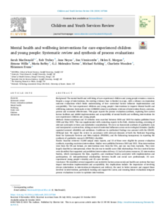Displaying 401 - 410 of 10391
This video explores why supporting kinship care is so important, and examines how to support kinship care using examples from government and NGOs in Zimbabwe.
This webinar explores the existing evidence of the connections between climate change and risks to children’s protection and discuss the role that child protection actors and the wider humanitarian community can take to ensure the protection of children and well-being of children impacted by the climate crisis.
During this webinar, participants explored the role of the Catholic Church in the separation of Indigenous children from their families and the long-lasting effect on Indigenous communities.
The purpose of this review was to describe in more detail the findings and range of research undertaken regarding the reintegration of children out of family-based care situations, thereby providing a mechanism for summarizing and disseminating research findings to policy makers, practitioners, and researchers who might otherwise lack time or resources to undertake such works themselves. The review has been undertaken with the motive of answering the question
of what is known from the existing empirical literature about the effectiveness and challenges of intervention programs that are meant to sustainably reintegrate children out of family-based care?
This scoping review aimed to identify the factors affecting the effectiveness of reintegration interventions targeting children outside family-based care. It aims to provide service providers with concise evidence regarding the situations affecting the effectiveness of reintegrating vulnerable children into the community by reviewing the relevant empirical evidence. Unlike other related reviews that have dealt with reintegration practices in selected regions or a specific country alone the present study considered research undertaken in all regions of the world.
This global systematic review incorporated a comprehensive search of available literature from 1990 and captures the extant literature relating to process evaluations for interventions which address care-experienced children and young people’s mental health and well-being, and is one of the first syntheses of process evaluations in social care.
This report is the Commission’s first annual enlargement report on Ukraine replacing the previous annual Association Implementation Reports. To complement its opinion on the membership application, the Commission published the analytical report on the acquis alignment of Ukraine in February 2023.
Changing the Way We Care (CTWWC) promotes safe, nurturing family care for children reintegrating from residential care facilities (often referred to as “orphanages”) and prevents child-family separation by strengthening families, reforming national systems of care for children, and working to shift donor and volunteer support away from residential care and toward family care alternatives.
To promote the return of juveniles to a home-like environment (e.g. living with (foster)parents) after secure residential treatment (SRT), it is important to know which factors are related to this outcome. The current study, based in the Netherlands, examined which characteristics of the juvenile, family, and SRT, including family centeredness and use of systemic interventions, are related to the living situation after discharge.
This report explores, through responses to an online survey, interviews and focus groups, the opportunities, challenges, barriers and facilitators that members of the workforce identify as factors which bring about high quality experiences and outcomes for children, young people and families using services; close multi-agency working between practitioners across different services; continuity of support when young people transition to adult services; high quality support for the workforce and transformational change in services.







